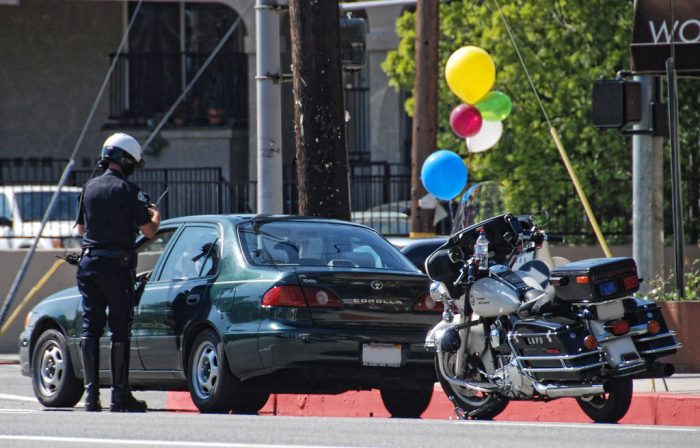Photo by Chris Yarzab
The City Council voted to not approve the award
(Somerville Wire) – For the first time in 10 years, Somerville’s City Council voted to turn down a grant that the Somerville Police Department has routinely received, which would have expanded its traffic enforcement capabilities. Three councilors voted in favor of the Municipal Road Safety Grant from the MA Office of Public Safety and Security, while eight councilors did not support it. The grant was first discussed at a Finance Committee meeting on Feb. 8, and Councilor Jake Wilson moved to sever it, opening a larger conversation at a City Council meeting on Feb. 10.
“The purpose of the grant is to help reduce roadway crashes, injuries, fatalities, and things of such,” said SPD Chief Charles Femino, at the Finance Committee meeting. “Its intended use of the funds is for not only traditional traffic safety programs but addressing the expansion of other programs that may not be strictly law enforcement or enforcement roles … One of the main goals of the program is to conduct high visibility enforcement … It will also provide non-enforcement strategies which would hopefully change driver behavior and reduce infractions.”
The grant would take the form of an award of $49,980. With this funding, the Somerville Police department would have been able “to assign additional officers to solely traffic enforcement duties during each identified campaign time.” The officers would be “assigned to predetermined locations where the need for enforcement is the greatest at that time.” Areas where the grant funded activity would have the greatest impact were identified in the grant application and included Alewife Brook Parkway, College Avenue, and Washington Street.
What troubled many councilors, like Councilor Charlotte Kelly, is that the program requires officers to meet a quota, issuing no fewer than three stops per hour. Establishing a quota places pressure on the officer to reach a certain number and pull over as many individuals as he or she can, rather than responding to problems as they come up. Kelly added that people of color and immigrants are already disproportionately stopped in their vehicles by police.
“Overwhelmingly, Asian American, Black, and Latinx residents are being pulled over at higher rates, in relation to their white counterparts, and they are more likely to be receiving civil and criminal penalties when they’re pulled over …” said Kelly. “This is a very local issue, here in Massachusetts, that when we increase and expand the role of traffic enforcement, we are often and disproportionately seeing it impact our Black and Brown residents, especially our residents under the age of 30. As a Council that has made it very clear that we care about ending and preventing the school to prison pipeline … about racial justice, I think overlooking these, in the pursuit of taking money without strings is actually quite the opposite.”
Councilor Jake Wilson said that the issue of traffic safety is one that very much concerns him but suggested that a different approach might be needed. He added that he had been seeking assurances that officers would have implicit bias and de-escalation training, that subjectivity in stopping drivers would be removed, but he was not convinced that Femino could give him those assurances. Wilson considered that there could be an alternative plan, where tickets are mailed, rather than issued in person. The interaction between officer and driver may not only be unsafe, it can be stressful or traumatic to the person being pulled over.
“We’re talking about state highways with no shoulders on them. If a stop is made on those highways, we’re talking about a risk to the officer, a risk to the car that’s pulled over, and a risk to passing motors. … Traffic stops are a problem for us, from a public safety point of view and an equity point of view,” said Wilson. “Can we eliminate the traffic stop and still get enforcement? I believe that the future of this involves not using traffic stops but by mailing warnings or tickets.”
Councilor J.T. Scott mentioned that a 415 report with Somerville data explains that even though the city has a Black population of 6.2%, this group makes up over 17% of traffic stops.
Councilor Beatriz Gomez-Mouakad, who voted in support of the grant, after feeling torn in both directions, said that we do not really know if this data accounts for drivers, such as Lyft or Uber workers, who may be passing through Somerville from a different area. Gomez-Mouakad said, emphasizing that she has heard from many immigrant constituents that they are concerned about road safety, that she does not ultimately believe that voting down this grant will solve the problem of systemic racism and that the issue is complex and multifaceted. She supported the Council in the decision that it made, in the end, but she said that the issue of racial profiling is bigger than this grant.
She added that she felt uncomfortable voting for or against the grant, because, “I would be admitting that the racial issue could be pinned down to a percentage point. I felt like, in my mind, [voting down the grant] makes everybody very comfortable. Everybody was like, ‘We overcame a racist issue.’ And I feel like we didn’t. I’m not opposed to what everyone is saying, and I support them, but I think we need to push things to another layer.”
Councilor Judy Pineda-Neufeld, who voted in support of the grant, said that she did not believe it is fair to construct an argument between safety and racial equity, during the Feb. 10 City Council meeting, “What I’m challenged with and troubled with, in this debate, is that we’re pitting an issue of safe streets with racial justice. I think that’s a false dichotomy. I think that we should be talking about equity through a lens that isn’t just a box we check but is a holistic piece of the conversation. … I have the second largest public housing development in this ward, in addition to Clarendon Towers, utilizing those streets and those intersections incredibly frequently, more often than not, because they don’t have cars. … I’m troubled at the ways in which we’re battling these two against each other, and I’m holding on to what has been asked of me by constituents.”
This article is syndicated by the Somerville Wire municipal news service of the Somerville News Garden project of the Boston Institute for Nonprofit Journalism.
All Somerville Wire articles may be republished by community news outlets free of charge with permission and by larger commercial news outlets for a fee. Republication requests and all other inquiries should be directed to somervillewire@binjonline.org. Somerville Wire articles are also syndicated by BINJ’s MassWire state news service at masswire.news.
SUBSCRIBE TO THE FREE SOMERVILLE WIRE EMAIL NEWSLETTER: https://eepurl.com/hpBYPv
Check out all our social media here: https://linktr.ee/SomervilleWire.
Shira Laucharoen is assistant director of the Boston Institute for Nonprofit Journalism and assistant editor and staff reporter of the Somerville Wire.








